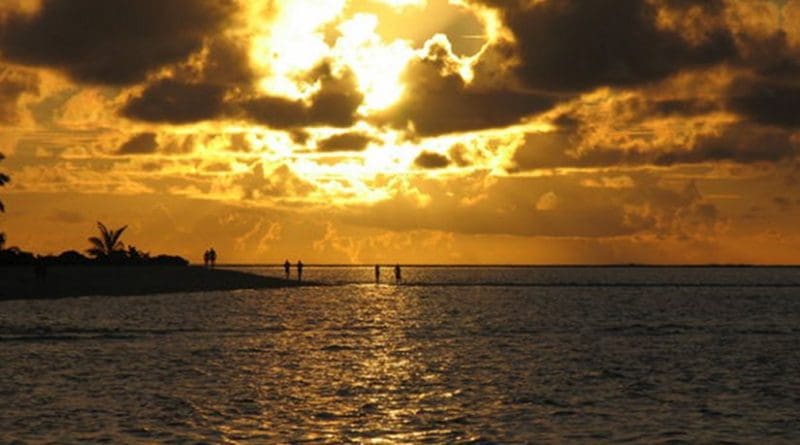India-Maldives Relations: Is The Neighborhood First Policy Still Intact – OpEd
A few days back, a hope was revived that India-Maldives dilapadating relations could recuperate back to normalcy. Maldives had claimed that India had voted for their candidacy for a non-permanent seat in the United Nations Security Council, which they lost to Indonesia by just winning 46 votes out of 190. Despite the Ministry of External Affairs of India evading the question when asked about India’s stand on the vote which is conducted by a secret ballot, Maldives still claimed that India had reassured them for at least three times, the recent being one day before UNSC vote.
However, the recent moves by Abdulla Yameen, President of the Maldives, have put the littoral state on a conflictual position with India. India risked irking the Maldives as it condemned the sentencing of former President Maumoon Abdul Gayoom, Chief Justice Abdulla Saeed and Justice Ali Hameed, who were given 19-month jail sentences over an alleged political conspiracy to overthrow the incumbent President Abdulla Yameen.
Ties between both countries have been unpleasant since February when Maldivian President declared a nation-wide emergency, which India called as a threat to democracy, and adding India’s latest remarks which also indicated that the unfair trial puts a question mark on the credibility of the entire process of Presidential elections in September this year, could further provoke the island nation which has antecedently hit back at India for commenting on its internal political affairs.
But the genuine setback came in March 2015 when Indian Prime Minister Narendra Modi canceled his state visit to the island nation as a show of disapproval against the mistreatment of former pro-India Maldivian President Mohammad Nasheed, who was in prison at that time facing treason and terrorism charges. In July 2015, the Maldives amended its constitution to allow foreign ownership of land, sparking Indian fears that China would try to develop strategic assets in the archipelago. Ties got a soothing touch when Yameen visited India in April 2016 and signed key agreements. But the peace didn’t last long.
China’s flourishing presence in the Maldives is a thoughtful concern to India given the latter’s geographic proximity to the Indian Ocean coastline. The Maldives also sit near international sea lanes through which India’s oil imports traverse. India’s security would be vulnerable if the Chinese set up a naval base in the Maldives. These concerns are not without substance; in August 2017, three Chinese naval vessels docked at the Maldives’ capital, Male, setting off alarm bells in New Delhi. Maldives also declined India’s invitation to take part in the 2018 edition of eight-day mega naval exercise – Milan – from March 6-13.
Yameen’s government has also declined to renew visas for Indians who are legally working in the Maldives, without giving any rational motives for the decision. If that was not enough, he has also started appealing Pakistan, India’s frontier foe. Soon after Pakistani army chief General Qamar Javed Bajwa paid a rare visit to Maldives in April, Pakistan offered a $10 million credit to finance the acquisition of two Super Mushak aircrafts. Maldives is the only neighbouring country that Modi is yet to visit since his inception to power.
The ongoing confrontation is completely about the presence and activities of the Indian security agencies on the Maldivian coral reefs. The Maldives needs to import workforce but it seems now they are less interested in depending on India, fearing that Indian security agencies might recruit the diaspora as a “fifth column” extended across the remote chain of 1,200 small coral islands and sandbanks, which constitute the island nation, over which Male lacks the capability to detect any suspicious activities carried by foreigners. The issue here is why the Maldives gets so berserk about Indians. Instead of sensing the misinterpretations or misunderstandings that have arisen, Indian agencies began striking back by using visa as an instrument to punish the Maldivian reigning elite.
A few days before the UNSC vote, Indian immigration authorities had repudiated entry to Ahmed Nihan, parliamentary Majority Leader of Yameen’s ruling Progressive Party of Maldives (PPM), when he landed at the Chennai Airport, supposedly for continual medical check-ups. Back home after being deported, Nihan alleged that India was putting efforts to bully his nation, but would not call it exclusive sanctions against Yameen’s acquaintances that some western nations were considering to levy. India had also allegedly declined to permit a Maldivian representative of Yameen’s party in the country to discuss on the February emergency.
While Modi’s “Neighborhood First” policy and Indian Ocean circuit convey that the regional security and shared economic development of the region are top-most priorities for India, Maldivian President Yameen has made his perspective crystal-clear that foreign powers should not poke their nose in archipelagic’s internal politics. Engaging in a difference of opinion with the Maldives over domestic affairs will severely degrade the prospects of Modi’s dynamic Indian Ocean diplomacy. While for Maldives, sidelining India would unquestionably shackle their economy.
The dilemma for India is whether to deal with these issues now, when it has the means to compel its will on the Maldives, or to proceed with its long-standing policy of not overtly meddling in the internal affairs of other countries. The Yameen government must reassess their discriminating policies towards India while India should think critically why the relations have deteriorated and accordingly a logical solution should come forward to reinstate peaceful relations between both countries.
*Abhishek Mohanty is studying M.A Politics: International and Area Studies at Jamia Millia Islamia, New Delhi. He is a Junior Research Associate at German Southeast Asian Center of Excellence for Public Policy and Good Governance- Bangkok, Junior Researcher at Center for Southeast Asian Studies- Indonesia, and Research Intern at Centre for Vietnam Studies- New Delhi. He is a member of Kalinga-Lanka Foundation. Research interests include critical analysis of foreign policies, regional and global issues of Indo-Pacific states.

